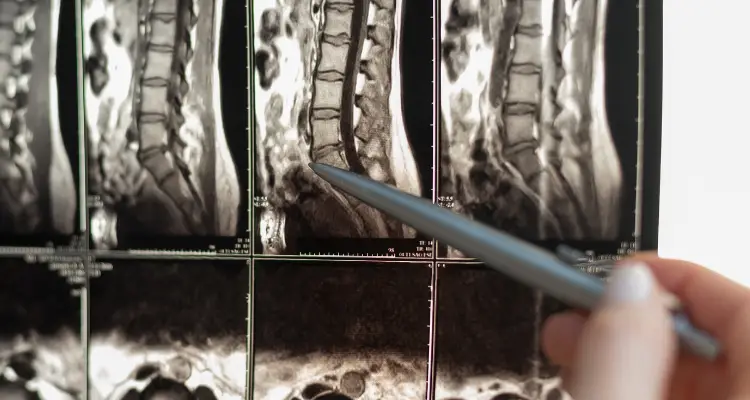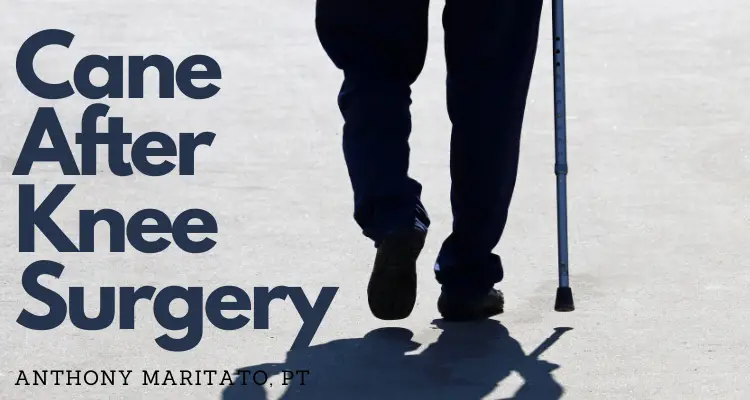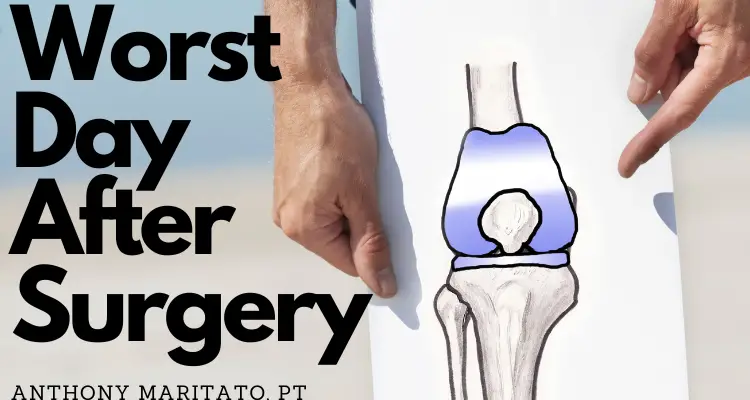Disadvantages of Knee Replacement Surgery
Table of Contents
Introduction
When considering treatment options for severe knee arthritis, one commonly considered intervention is knee replacement surgery. Despite its high success rate, it’s essential to understand that there are potential disadvantages of knee replacement surgery. These include postoperative pain, time spent in recovery, hidden costs, stress, and risk of surgical complications.
As a licensed physical therapist specializing in total knee replacement surgery, I’ve helped hundreds of patients through their recovery process. This article aims to shed light on these disadvantages, based on firsthand experience and stories shared by thousands through our online community, to aid individuals in making a well-informed decision about their treatment options.

Pain
The pain associated with recovery from total knee replacement surgery can be a significant disadvantage. It’s an unfortunate paradox: the procedure undertaken to alleviate pain can sometimes lead to prolonged discomfort during recovery and, in some cases, long after the surgery.
While total knee arthroplasty (TKA), commonly known as knee replacement surgery, is one of the most performed orthopaedic surgeries in the United States, research shows that patient satisfaction can be lower than expected. A systematic review from 2010 to 2022 discovered that the average rate of dissatisfaction following TKA was 10%, excluding complications. A substantial part of this dissatisfaction was due to persistent pain after the surgery, which in some instances, might be more debilitating than the original osteoarthritis pain. (source)
Even though this rate of dissatisfaction is lower than the historically reported rate of 20%, it’s still a significant factor for potential TKA patients to consider. One in every ten patients being dissatisfied with their TKA outcome underscores the importance of weighing the potential disadvantages of this surgery against its benefits. Preoperative counselling for known risk factors such as age, income, and mental health conditions can help reduce dissatisfaction rates. Nevertheless, the issue of pain following surgery remains a substantial concern.
Time Lost
Another key disadvantage of knee replacement surgery involves the significant time spent in recovery. It’s important to consider that this time could be invested differently to improve physical function and reduce pain without undergoing surgery.
Recovery Period
Post-surgery, patients typically require between three months to a year to recover fully. During this period, patients often need to limit their activities, and the majority of their time may be spent on physical therapy and rehabilitation.
Non-Surgical Alternatives
Non-surgical alternatives such as physical therapy, weight management, and use of supportive devices can often provide significant pain relief and functional improvements without the need for surgery. These strategies also enable individuals to maintain their daily routines while improving their knee condition, hence, not losing significant time to recovery.
Physical Therapy
Physical therapy exercises can strengthen the muscles around the knee joint, improve flexibility, and reduce pain. Implementing such an exercise regimen during the time typically lost to recovery can not only manage symptoms but can also improve overall physical fitness.
Weight Management
Maintaining a healthy weight can reduce the load on the knee joint and slow the progression of osteoarthritis. Investing time in a balanced diet and regular exercise during the recovery period can lead to significant weight loss and reduced knee pain.
Use of Supportive Devices
Using knee braces, wedges, and orthotic shoe inserts can help manage knee pain by supporting and relieving stress on the knee joint. These aids can be used throughout the day without significant interruptions to daily routines, making them a time-effective management strategy.
While knee replacement surgery can be an effective intervention, the time lost to recovery is substantial. This time could instead be utilized to pursue non-surgical strategies that can improve knee function and reduce pain while preserving the patient’s daily routine.
Cost
While insurance often covers the expense of knee replacement surgery itself, there are several associated costs that patients might need to consider. These can significantly contribute to the total out-of-pocket expenditure and should be carefully considered before deciding to undergo the procedure.
Non-Covered Costs
There are certain aspects of knee replacement surgery that insurance typically doesn’t cover. Physical therapy sessions, for instance, might not be fully covered, leading to significant out-of-pocket costs over the recovery period. Similarly, prescription medications needed for pain management or to prevent postoperative complications may also not be covered entirely.
Equipment and Home Modifications
Recovery often necessitates specialized equipment such as walkers, canes, or raised toilet seats. Home modifications might also be needed to ensure safety and accessibility, including installation of handrails or ramps. These costs can add up quickly, and insurance often doesn’t cover them.
Costs Associated with Complications
Complications such as infections or failed hardware can lead to additional surgeries, hospital stays, and prolonged recovery periods. The financial burden associated with these complications can be substantial.
Lost Income
The prolonged recovery period and associated limitations might mean taking extended time off work. For some, this might not be paid leave, leading to a significant loss of income. For those who are self-employed or who work jobs that require physical labor, this financial loss can be especially hard-hitting.
In conclusion, the costs associated with knee replacement surgery can go far beyond the surgery itself. While the procedure might alleviate pain and improve mobility, the financial implications should not be underestimated.
Stress
Another critical disadvantage of knee replacement surgery that often gets overlooked is the stress associated with the procedure and its aftermath. This stress can manifest in a variety of ways and can have a substantial impact on an individual’s mental and physical well-being.
Uncertainty and Fear
Even though knee replacement is a common procedure, it still involves a degree of uncertainty. Worries about surgical complications, how long recovery will take, and whether the surgery will alleviate the pain can create significant stress for patients. This fear of the unknown can be psychologically taxing and can contribute to preoperative anxiety.
Recovery Stress
Postoperative recovery is not just a physical process; it’s a mental one as well. Patients must cope with the stress of pain management, limited mobility, and the rigors of physical therapy. They may also struggle with feelings of dependence and frustration over not being able to do tasks they could do before the surgery.
Lifestyle Changes
Following surgery, patients must often make significant lifestyle changes. They may have to avoid certain activities they used to enjoy or modify the way they perform daily tasks. Adjusting to these new limitations can cause stress and may impact an individual’s quality of life.
Financial Stress
As mentioned in the previous section, the cost of surgery, rehabilitation, and potential loss of income can create financial stress. Managing these financial aspects can add to the overall stress of the procedure and recovery period.
In conclusion, while knee replacement surgery can provide significant relief from chronic knee pain, the stress associated with the procedure and its recovery can be a substantial disadvantage. It’s crucial for individuals considering the surgery to be fully aware of these potential stressors and to plan for how they will manage them.
Post-Surgical Risk or Complications
Knee replacement surgery, like any surgical procedure, comes with inherent risks and potential complications. These potential issues can impact recovery, long-term outcomes, and patient satisfaction.
Surgical Complications
Complications during the procedure itself, though relatively rare, can include infection, blood clots, and anesthesia complications. These events can extend hospital stays and recovery times, and in severe cases, may require additional surgeries.
Prosthetic Failures
Although modern knee implants are designed to last for many years, they can sometimes fail earlier than expected due to factors like poor surgical technique, the patient’s activity level, or manufacturing defects. Prosthetic failure can cause pain, instability, and reduced mobility, often necessitating a revision surgery.
Infection
One of the most serious complications of knee replacement surgery is infection, which can occur in the wound or around the prosthetic implant. While postoperative antibiotics and careful surgical technique reduce this risk, infections can still happen and can be challenging to treat, sometimes requiring additional surgeries or long-term antibiotic therapy.
Chronic Pain and Stiffness
While most patients experience pain relief following knee replacement surgery, some continue to have chronic pain or stiffness in the operated knee. This outcome can significantly impact satisfaction and quality of life, and managing it can be challenging.
In conclusion, the risk of complications is an important disadvantage to consider when contemplating knee replacement surgery. Thoroughly discussing these potential issues with your medical provider is an essential step in making a well-informed decision about the procedure.
Summary
Total knee replacement surgery, while often an effective means of alleviating chronic knee pain and improving mobility, comes with several disadvantages that are important to consider. These include the potential for significant postoperative pain, a lengthy recovery period, substantial out-of-pocket costs, high levels of stress, and the risk of post-surgical complications.
Pain: Even after surgery, some patients experience persistent pain which in some cases can be more debilitating than the original osteoarthritis pain. A reported 10% of patients express dissatisfaction with their outcome due to this persistent discomfort.
Time Lost: The recovery period from knee replacement surgery is substantial, typically between three months to a year. This time could be invested differently, implementing non-surgical strategies like physical therapy, weight management, and use of supportive devices, which can improve knee function and reduce pain without losing significant time to recovery.
Cost: Beyond the cost of the surgery itself, there are numerous associated costs, including non-covered therapy sessions, specialized equipment, potential home modifications, and the loss of income due to time off work. These costs can add up quickly, contributing significantly to the financial burden of this procedure.
Stress: The uncertainty surrounding surgery and the challenges of the recovery process can contribute to high levels of stress. This stress can manifest in various ways, including fear of the unknown, frustration over limitations during recovery, and financial stress due to the costs associated with the procedure.
Post-Surgical Risks or Complications: Knee replacement surgery also carries inherent risks, including surgical complications, prosthetic failures, infection, and the potential for chronic pain and stiffness. These complications can impact recovery, long-term outcomes, and patient satisfaction.
In conclusion, while knee replacement surgery can indeed offer relief for many patients, it’s essential to weigh these potential disadvantages against the potential benefits when considering the procedure.

Anthony Maritato, PT
Physical Therapist
Anthony Maritato, PT has been a licensed physical therapist and private practice owner since 2006. Ohio license #PT011602.
Anthony has been passionate about helping patients recover from total knee replacement surgery as well as rotator cuff repair surgery.

Managing Pain After Total Knee Replacement
Introduction to Managing Pain After a Knee Replacement Undergoing a total knee replacement is a significant medical procedure that can dramatically improve your quality of life. However, the journey to full recovery involves navigating through various challenges, one...

Total Knee Replacement Pain at Night
What to Expect Explore our comprehensive guide on managing 'Total Knee Replacement Pain at Night.' Learn about the causes of night pain, effective pain management strategies, best sleeping positions, and more. This article provides practical advice to help individuals...

Overview of Spinal Stenosis
Table of Contents What is spinal stenosis What are the symptoms of spinal stenosis How is spinal stenosis diagnosed What are the different types of treatment for spinal stenosis Where to find more information 1. What is spinal stenosis Spinal stenosis is a condition...

Spinal Stenosis Exercises to Avoid: During Knee Replacement Recovery
Spinal stenosis is relatively common among adults having a total knee replacement surgery. While spinal stenosis doesn't always impact total knee replacement recovery, when it does, it can be frustrating. Before I specialized in treating patients after a total knee...

Ride a Peloton After Knee Replacement Surgery
Table of Contents When can I return to riding my Peloton bike at home after a total knee replacement? Is a Peloton bike good physical therapy after a total knee replacement surgery? Will riding my Peloton too much wear out my new knee? How often should I ride my...

How to Use a Cane After Knee Surgery
Table of Contents Understanding the Purpose of Using a Cane after Knee Surgery How to Properly Use a Cane after Knee Surgery Common Mistakes to Avoid When Using a Cane Transitioning from a Walker to a Cane: When and How? Understanding the Purpose of Using a Cane after...

Ice Machine for Knee Surgery
Table of Contents Benefits of Using an Ice Machine After Knee Surgery How an Ice Machine Works Top Ice Machines for Knee Surgery Recovery How to Use an Ice Machine After Knee Surgery Where to Buy an Ice Machine and What to Consider Benefits of Using an Ice Machine...

Walking Your Dog After Knee Replacement Surgery: A Timeline for Recovery
Table of Contents Introduction Walking Your Dog After Knee Replacement Safety Considerations and Precautions Conclusion Introduction Hello, fellow dog lovers and knee replacement warriors! I'm Anthony Maritato, a licensed physical therapist specializing in post-total...

Top 5 Mistakes After Knee Replacement
In this article I will share my experience as a physical therapist and personal trainer of more than 22 years treating patients after total knee replacement surgery. I have seen patients who made every mistake possible and still had a great outcome following this...

Worst Day After Knee Replacement
What is the worst day after knee replacement? I am a physical therapist who specializes in treating patients after a total knee replacement. In my experience, the worst day after knee replacement is the third day. I will explain why in this article and share some...